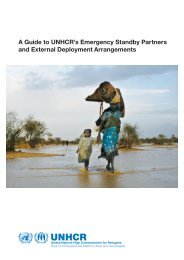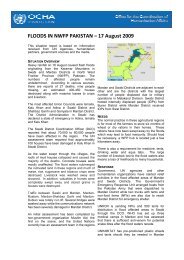Women, Girls, Boys and men - HumanitarianInfo.org
Women, Girls, Boys and men - HumanitarianInfo.org
Women, Girls, Boys and men - HumanitarianInfo.org
You also want an ePaper? Increase the reach of your titles
YUMPU automatically turns print PDFs into web optimized ePapers that Google loves.
• the right to an adequate st<strong>and</strong>ard of living, including<br />
food, clothing <strong>and</strong> housing;<br />
• the right to the highest attainable st<strong>and</strong>ard of physical<br />
<strong>and</strong> <strong>men</strong>tal health; <strong>and</strong><br />
• the right to work <strong>and</strong> to favourable conditions of work.<br />
Under international human rights law, States have the<br />
obligation to respect, protect <strong>and</strong> fulfil human rights.<br />
The obligation to respect requires that a State, principally,<br />
refrain from interfering directly or indirectly with the<br />
enjoy<strong>men</strong>t of the right; the obligation to protect means<br />
preventing third parties from interfering with the enjoy<strong>men</strong>t<br />
of the right; <strong>and</strong> fulfilling human rights means taking<br />
steps to realize the right in question, progressively in<br />
the case of economic, social <strong>and</strong> cultural rights. In order<br />
to meet these obligations, States should, inter alia, put in<br />
place appropriate policies; review <strong>and</strong> ensure (by a<strong>men</strong>ding,<br />
enacting or repealing) that national legislation is in<br />
conformity with international st<strong>and</strong>ards; ensure that an<br />
effective institutional framework (e.g. police, judicial system,<br />
prisons, etc.) exists to protect <strong>and</strong> claim rights, <strong>and</strong><br />
offer possibilities for individuals <strong>and</strong> groups to seek remedy<br />
when their rights have been violated; imple<strong>men</strong>t programmes<br />
to give effect to rights; <strong>and</strong> seek international<br />
assistance <strong>and</strong> cooperation as needed.<br />
<strong>Wo<strong>men</strong></strong>’s human r ghts<br />
Despite the fact that international law guarantees wo<strong>men</strong><br />
<strong>and</strong> <strong>men</strong> equal rights in the enjoy<strong>men</strong>t of all human<br />
rights, wo<strong>men</strong> <strong>and</strong> girls continue to face de jure (in law)<br />
<strong>and</strong> de facto (in practice) inequalities in virtually all societies.<br />
In addition, armed conflict <strong>and</strong> natural disasters<br />
often exacerbate discrimination <strong>and</strong> inequalities, further<br />
impeding progress towards gender equality <strong>and</strong> the full<br />
enjoy<strong>men</strong>t by wo<strong>men</strong> of their human rights. Humanitarian<br />
assistance <strong>and</strong> protection during armed conflicts <strong>and</strong><br />
natural disasters should contribute to achieving equality<br />
<strong>and</strong> wo<strong>men</strong>’s human rights. The involve<strong>men</strong>t of <strong>men</strong> <strong>and</strong><br />
boys as partners in empowering wo<strong>men</strong> <strong>and</strong> girls <strong>and</strong><br />
achieving gender equality is also of crucial importance.<br />
The Convention on the Elimination of All Forms of<br />
Discrimination against <strong>Wo<strong>men</strong></strong> (CEDAW) was adopted in<br />
1979 to reinforce the provisions of existing international<br />
instru<strong>men</strong>ts aiming to eliminate discrimination against<br />
wo<strong>men</strong> <strong>and</strong> achieve gender equality. To date, it has been<br />
ratified by 183 States. Despite being the subject of more<br />
reservations than any other human rights treaty, the<br />
significant number of ratifications is expression that the<br />
international community considers that discrimination<br />
against half the world’s population is unacceptable <strong>and</strong><br />
I A s c g e n D e r h A n D b o o k<br />
should be eliminated. UN <strong>and</strong> other actors should build<br />
on — <strong>and</strong> promote — this international legal consensus<br />
in their work during conflicts <strong>and</strong> disasters.<br />
CEDAW defines discrimination against wo<strong>men</strong> as “any<br />
distinction, exclusion or restriction made on the basis of<br />
sex which has the effect or purpose of impairing or nullifying<br />
the recognition, enjoy<strong>men</strong>t or exercise by wo<strong>men</strong>,<br />
irrespective of their marital status, on a basis of equality<br />
of <strong>men</strong> <strong>and</strong> wo<strong>men</strong>, of human rights <strong>and</strong> funda<strong>men</strong>tal<br />
freedoms in the political, economic, social, cultural, civil<br />
or any other field.” It imposes obligations on States to, inter<br />
alia, embody the principle of equality of wo<strong>men</strong> <strong>and</strong><br />
<strong>men</strong> in their national constitutions <strong>and</strong> legislation; adopt<br />
legislative <strong>and</strong> other measures prohibiting discrimination<br />
against wo<strong>men</strong>; effectively protect wo<strong>men</strong> against any act<br />
of discrimination <strong>and</strong> provide opportunities for recourse;<br />
take measures to modify social <strong>and</strong> cultural patterns that<br />
contribute to discrimination against wo<strong>men</strong>; suppress<br />
prostitution <strong>and</strong> trafficking of wo<strong>men</strong>; <strong>and</strong> ensure equality<br />
in political <strong>and</strong> public life, nationality laws, education,<br />
employ<strong>men</strong>t <strong>and</strong> labour rights, access to health, finance<br />
<strong>and</strong> social security, legal <strong>and</strong> civil matters <strong>and</strong> family law.<br />
It permits States to adopt temporary special measures to<br />
achieve equality.<br />
While CEDAW does not address the gender-based violence<br />
that is often widespread in crisis situations, the<br />
Committee that monitors the Convention’s imple<strong>men</strong>tation<br />
has addressed the issue in its General Recom<strong>men</strong>dation<br />
No. 19 <strong>and</strong> jurisprudence, opining that “the definition<br />
of discrimination includes gender-based violence, that is,<br />
violence that is directed against a woman because she<br />
is a woman or that affects wo<strong>men</strong> disproportionately. It<br />
includes acts that inflict physical, <strong>men</strong>tal or sexual harm<br />
or suffering, threats of such acts, coercion <strong>and</strong> other deprivations<br />
of liberty. The International Criminal Tribunals<br />
for the former Yugoslavia <strong>and</strong> Rw<strong>and</strong>a have prosecuted<br />
crimes of sexual violence, thereby providing legal precedents<br />
for protecting wo<strong>men</strong> <strong>and</strong> combating impunity for<br />
violations of their rights. The Rome Statute of the International<br />
Criminal Court (ICC) explicitly recognizes that, under<br />
specified circumstances, sexual violence constitutes<br />
an international crime.<br />
In addition to the human rights treaties, several UN resolutions<br />
<strong>and</strong> world conferences have sought to strengthen<br />
the protection <strong>and</strong> promotion of wo<strong>men</strong>’s human rights.<br />
These include the 1993 World Conference on Human<br />
Rights, which affirmed the universality of wo<strong>men</strong>’s rights<br />
as human rights, stressed the importance of eliminating<br />
violence against wo<strong>men</strong> <strong>and</strong> especially recognized violence<br />
against wo<strong>men</strong> in armed conflict as a violation of<br />
T H e I n T e R n AT I o n A l l e G A l F R A m e w o R k F o R P R o T e C T I o n<br />
LEGAL FRAMEWORK











